Related Research Articles

Kim Hee-sun is a South Korean actress. She rose to fame in the 1990s with leading roles in television series such as Men of the Bath House (1995), Propose (1997), Wedding Dress (1997), Forever Yours (1998), Mister Q (1998), Sunflower (1998), and Tomato (1999). Kim also starred in the martial arts films Bichunmoo (2000) and The Myth (2005), historical media drama Faith (2012), teen drama Angry Mom (2015), mystery drama The Lady in Dignity (2017), and fantasy drama Tomorrow (2022).
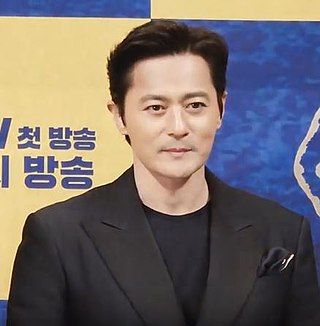
Jang Dong-gun is a South Korean actor. He is best known for his leading roles in the films Friend (2001) and Taegukgi: The Brotherhood of War (2004).

Kim Kyu-sik, also spelled Kimm Kiusic, was a Korean politician and academic during the Korean independence movement and a leader of the Provisional Government of the Republic of Korea. Kim served in various roles in the provisional government, including as foreign minister, ambassador, education minister and finally as the vice president from 1940 until the provisional government's dissolution on March 3, 1947. Kim's nicknames included Usa(우사), Kummun(금문), Kimsong(김성), and Chukchok(죽적).
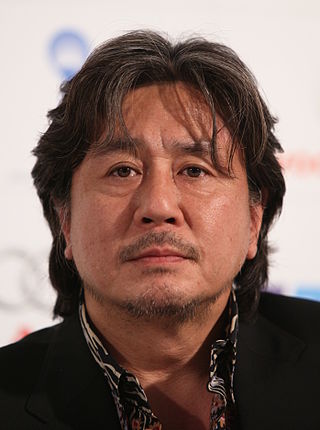
Choi Min-sik is a South Korean actor. He received critical acclaim for his roles in Oldboy (2003), I Saw the Devil (2010) and The Admiral: Roaring Currents (2014).
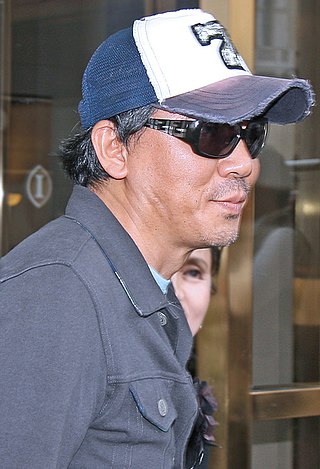
Kim Jee-woon is a South Korean film director, screenwriter, and producer. Kim was a theater actor and director before debuting with his self-written and directed film, The Quiet Family in 1998. Kim has worked with increasing levels of success in cinema, showing accomplished acting and a detailed stylization in his films. He is currently one of the most talented and recognized writers/directors in the Korean film industry.

Cha Tae-hyun is a South Korean actor, singer, television personality, radio DJ and director. He is best known for his lead roles in the box-office hit comedies My Sassy Girl (2001), Scandal Makers (2008), Hello Ghost (2010) and fantasy drama action hit Along with the Gods: The Two Worlds (2017) as well as the television series Jeon Woo-chi (2012), The Producers (2015) and Police University (2021). He made his directorial debut with the variety-drama Hit the Top (2017), in which he also starred.

The Hanwha Eagles are a South Korean professional baseball team based in Daejeon. They are a member of the KBO League. The Eagles' home ballpark is Daejeon Hanbat Baseball Stadium. The Eagles have won the Korean Series once, in 1999, and the league pennant twice. As of 2022, the Eagles have played in the postseason 13 times, being the runner-up in the Korean Series five times.
Korea Electric Power Corporation, better known as KEPCO or Hanjeon, is the largest electric utility in South Korea, responsible for the generation, transmission and distribution of electricity and the development of electric power projects including those in nuclear power, wind power and coal. KEPCO, through its subsidiaries, is responsible for 93% of Korea's electricity generation as of 2011. The South Korean government owns a 51.11% share of KEPCO. Together with its affiliates and subsidiaries, KEPCO has an installed capacity of 65,383 MW. On the 2011 Fortune Global 500 ranking of the world's largest companies, KEPCO was ranked 271. KEPCO is a member of the World Energy Council, the World Nuclear Association and the World Association of Nuclear Operators. As of August 2011, KEPCO possesses an A+ credit rating with Fitch Ratings, while Moody's has assigned KEPCO an A1 stable rating.

Jang Song-thaek was a leading figure in the government of North Korea. He was married to Kim Kyong-hui, the only daughter of North Korean Premier Kim Il Sung and his first wife Kim Jong-suk, and only sister of North Korean general secretary Kim Jong Il. He was therefore the uncle of current leader of North Korea, Kim Jong Un.
The Order of Cultural Merit is one of South Korea's orders of merit. It is awarded by the President of South Korea for "outstanding meritorious services in the fields of culture and art in the interest of promoting the national culture and national development."

Kim Joo-hyuk was a South Korean actor. He was known for his leading roles in the films My Wife Got Married (2008), The Servant (2010), and Yourself and Yours (2016), his supporting roles in Confidential Assignment (2017) and Believer (2018), as well as the television series Lovers in Prague (2005), God of War (2012), Hur Jun, The Original Story (2013) and Argon (2017). He was also an original regular cast member on the third season of the KBS2's reality-variety show 2 Days & 1 Night.

The MBC Gayo Daejejeon is an annual, end-of-the-year South Korean music show broadcast by the Munhwa Broadcasting Corporation (MBC). The event was first held in 1966 as a singing competition, but MBC stopped giving out awards in 2005.

Park Hyung-sik is a South Korean actor, singer and dancer. After three years of training, he debuted as a member of the South Korean boy group ZE:A in 2010. As an actor, he is known for his roles in The Heirs (2013),High Society (2015), Hwarang: The Poet Warrior Youth (2016), Strong Girl Bong-soon (2017), Suits (2018), Happiness (2021), Soundtrack #1 (2022) and Our Blooming Youth (2023). He also starred in films and musical theatre productions.
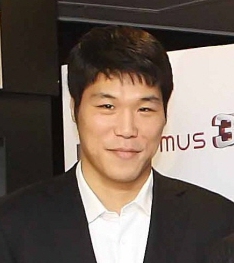
Seo Jang-hoon is a South Korean former professional basketball player, who is currently active as an entertainer and variety show star.

Our Gap-soon is a 2016–2017 South Korean television series starring Kim So-eun and Song Jae-rim. This is the first time that a virtual couple from MBC's We Got Married co-stars as main cast in a serial drama on a national Korean television network. It aired on SBS every Saturdays to Sundays at 20:45 (KST) from August 27 to October 30, 2016, and then 2 episodes every Saturday from November 5, 2016 to April 8, 2017. This change generated a rating increase that led to an 11-episode extension, making the series end with 61 episodes.

Suits is a South Korean television series starring Jang Dong-gun and Park Hyung-sik. The drama is based on the American television series of the same name by Aaron Korsh. It aired on KBS2 starting April 25, 2018 on Wednesdays and Thursdays at 22:00 (KST) for 16 episodes.
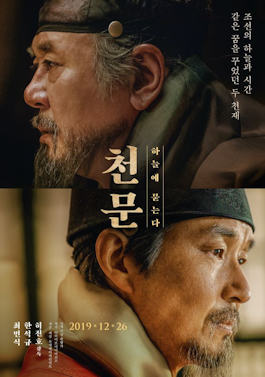
Forbidden Dream is a 2019 South Korean historical drama film directed by Hur Jin-ho and written by Jung Bum-shik and Lee Ji-min. Based on a true story, it portrays Sejong the Great, king of the Joseon dynasty of Korea, and his relationship with his greatest scientist, Jang Yeong-sil. It made its international debut at the 2020 New York Asian Film Festival in August 2020.

Unexpected Business is a South Korean reality show program by tvN starring Cha Tae-hyun and Jo In-sung, who unexpectedly become the bosses of a countryside grocery store for 10 days. They take over the store's operations, such as ringing up purchases and managing inventory, and also serve simple meals and snacks.
References
- 1 2 "프로필: 張榮植 한전 사장 내정자" [Profile: Jang Young-sik, nominee for KEPCO president]. Yonhap News. 1998-05-04. Retrieved 2013-10-17.
- ↑ 秋旺勳 [Chu Wang-hun] (1998-05-15). "韓電사장에 張榮植씨 임명" [Jang Young-sik nominated as KEPCO president]. Retrieved 2013-10-17.
- ↑ 김성용 [Kim Seong-yong] (1999-06-05). "장영식 전사장, 미국 비자 만료로 귀국" [Corporate ex-president Jang Young-sik's U.S. visa expiring, will return to country]. Yonhap News. Retrieved 2013-10-17.
- ↑ Jang 1970
- ↑ "한나라당, 張榮植한전 사장 내정 비판" [Grand National Party criticises Jang Young-sik KEPCO nomination]. Yonhap News. 1998-05-05. Retrieved 2013-10-17.
- ↑ 秋旺勳 [Chu Wang-hun] (1998-05-15). "韓電사장 내정자 응모당시 '결격자' 논란" [Controversy whether nominee for KEPCO presidency 'not qualified' at time of application]. Yonhap News. Retrieved 2013-10-17.
- ↑ Doug Rogers, Internal Revenue Service (1998-10-22). "Quarterly Publication of Individuals, Who Have Chosen To Expatriate, as Required by Section 6039G". Federal Register. 63 (204): 56696–56698.
- ↑ "한전 장사장 24일 오전중 사표 제출" [KEPCO president Jang will submit resignation on 24th]. Yonhap News. 1999-04-21. Retrieved 2013-10-17.
- ↑ 신삼호 [Sin Sam-ho] (1999-11-04). "한국전력 경영수지 개선됐나" [KEPCO management figures show improvement]. Yonhap News. Retrieved 2013-10-17.
- ↑ 신삼호 [Sin Sam-ho] (1999-11-04). "장영식전사장, '한전 경영개선 기여'" [Former president Jang Young-sik 'contributed to KEPCO management improvements']. Yonhap News. Retrieved 2013-10-17.
- ↑ 서영아 [Seo Young-ah] (2000-12-28). "한전 前사장 판공비 月858만원…경실련, 公기업 조사" [Former KEPCO president's expense account ₩8.58 million per month; Citizens' Coalition for Economic Justice investigates public companies]. The Dong-A Ilbo. Retrieved 2013-10-17.
- ↑ "장영식 前한전사장 '99년 대북送電 계획 기술 문제로 포기'" [Former KEPCO president Jang Young-sik: 'Gave up up 1999 North Korea power transmission plan due to technical problems']. The Dong-A Ilbo . 2005-07-14. Retrieved 2013-10-17.
- ↑ "장영식 전 한전사장, 한양대 석좌교수 임명" [Former KEPCO president Jang Young-sik named to Hanyang U. endowed chair professorship]. Yonhap News. 1999-08-26. Retrieved 2013-10-17.